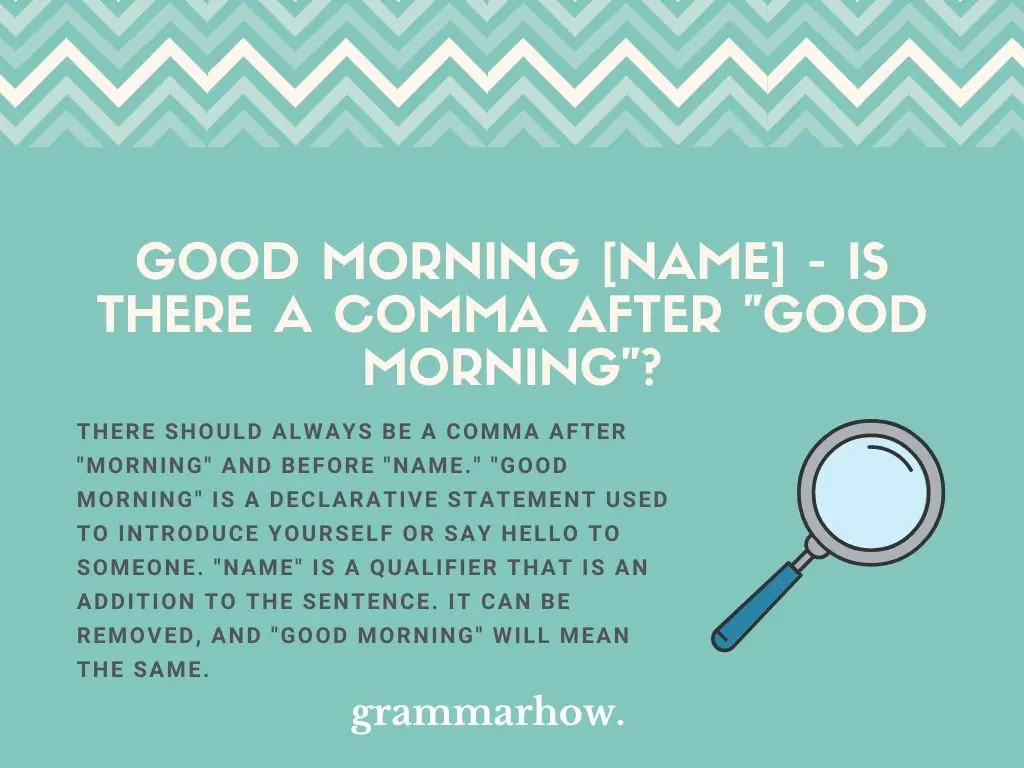Commas are surprisingly important in English, and it would help to know where to put them. This article will look into placing a comma in the phrase “good morning, [name].” While it’s often overlooked, it would be useful to know where to put it.
Good Morning [name] – Is There A Comma After “Good Morning”?
There should always be a comma after “morning” and before “name.” “Good morning” is a declarative statement used to introduce yourself or say hello to someone. “Name” is a qualifier that is an addition to the sentence. It can be removed, and “good morning” will mean the same.

If you’re ever confused about whether you need a comma in situations like this, you can refer to the following:
- Good morning, Sam.
- Good morning.
If we remove “Sam,” the meaning of “good morning” stays the same. It is still a polite way to say hello to someone you’re seeing in the morning.
The comma is required regardless of the name used. It is also required even when a name isn’t used (i.e. if you’re using an additional, unqualified clause like “everyone” or “whoever is listening”).
Standard English rules require commas to be present in strings like this to make sure you are separating them in the correct way. Since “good morning” works well as a standalone sentence, it makes sense that a comma should be required.
Even informally, it’s best to include a comma before the name to show that you appreciate and understand punctuation rules.
The only exception to this case might come from text messages. Some native speakers will opt to drop the comma in text messages (along with most other forms of punctuation). Punctuation isn’t common in informal texting.
Outside of texting, though, the comma should always be used. Do not get lazy with your punctuation usage, and make sure you always stick to using it before “name.”
Email Examples
Perhaps it would help to see a few examples in a given context. We’ll help you to understand all there is to know about it.
- Good morning, Tom,
- I hope you’re well, and I’d like to talk to you about what I expect going forward.
- Kind regards,
- Mr. Smith
- Good morning, Sarah,
- I think this is more than enough to go on. I’ll be sure to continue probing until I find what I need.
- Thank you,
- Terry
- Good morning, Susan,
- I’m glad to hear from you. Is there anything I can do right now that will make things easier for you?
- All the best,
- Mrs. Garb
- Good morning, Benny,
- I think you’ll find this department to be the most helpful for you. It’s got the right people you’re looking for.
- My best,
- Mr. Walters
- Good morning, Joey,
- I’m good, thank you! How have you been holding up? It feels like we haven’t emailed in years.
- I hope you’re well,
- Mary
“Good morning, [name]” always requires a comma. Whether you’re writing formally or informally, a comma is standard practice in English. Make sure you include it whenever you’re trying to show that you understand punctuation rules.
Is There A Comma In “Good Morning Everyone”?
“Good morning, everyone” always requires a comma. The comma must always come after “good morning” to show that you are separating it from the rest of the sentence. “Everyone” is just an unqualified name (without a specific person attached to it), but it works the same way.
“Everyone” isn’t the only other word that has to be punctuated in this way. Everything that comes after “good morning” as a greeting should have a comma before.
- Good morning, everyone.
- Good morning, all.
- Good morning, guys.
- Good morning, team.
- Good morning, whoever you are.
- Good morning, friend.
The only time when a comma is not used is when a preposition comes directly after “good morning:”
- Good morning to you, good sir.
- Good morning to everyone here.
However, this is not particularly common, so it’s best to avoid doing so. “To” does allow you to replace the comma, but it’s not something that you’ll often come across.
Final Thoughts
You should always place a comma in “good morning, [name].” Specifically, it comes after “morning” and before “name.” It allows you to split up the two clauses, where “good morning” is an introductory or declarative statement and “name” is an additional clause.
You may also like:
Goodmorning or Good morning? (Helpful Examples)
12 Different Ways To Say “Good Morning”
27 Best Replies To “Good Morning” (For All Situations)

Martin holds a Master’s degree in Finance and International Business. He has six years of experience in professional communication with clients, executives, and colleagues. Furthermore, he has teaching experience from Aarhus University. Martin has been featured as an expert in communication and teaching on Forbes and Shopify. Read more about Martin here.
